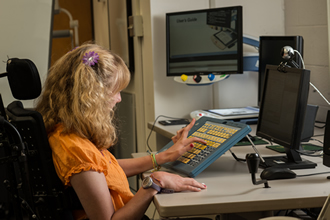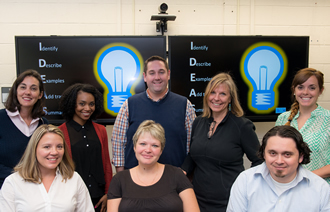Assistive Technology Programs Now Online
Assistive Technology Programs Now Online
November 11, 2013
The MEd in Curriculum and Instruction program launched the Assistive Technology concentration and certificate in a fully online format.
These programs are designed to enhance the knowledge and skills of general and special educators, related service personnel, families, caregivers, and many others who want to utilize assistive technology (AT) to support those with special needs. The online format removes barriers of time and location that would be encountered with a face-to-face program.
“We have the second oldest Assistive Technology program in the nation and a relatively large number of faculty with diverse experiences,” explained Director Michael Behrman. “So, we wanted to offer the programs online to make our expertise available to an expanded audience.”
One professor in the Assistive Technology graduate programs, Dr. Yoosun Chung, has particularly unique experiences that she shares with students in EDAT 530 Assistive Technology for Independent Living. In this course, graduate students become familiar with activities of daily living (ADLs) of individuals with disabilities and the elderly. AT is often used by these populations to support their performance of ADLs such as dressing, feeding, maintaining hygiene, housework, and safety.
Fittingly, AT is what permits Dr. Chung to teach. She has cerebral palsy which affects her speech and mobility, and English is her second language. These factors combined make it difficult for her to have spontaneous communication. So, she uses a type of AT called Augmentative and Alternative Communication (AAC) to teach face-to-face sessions and prepare her course videos.
“There are many kinds of AAC, and I am using EZKeys software by Words+, Inc. Basically, EZKeys transfers all my texts into synthesized (computer generated) voices,” explains Dr. Chung.
“It would not be possible for me to teach without my communication device,” says Dr. Chung in the Welcome to EDAT 530 video. “This is not unique to me. Many people with disabilities benefit from assistive technology. In this class, you will learn about various assistive technologies that individuals with special needs, including the elderly, can utilize in order to make their environment more livable in everyday life,” she expounds.
Students explore assistive technologies in course activities ranging from online group discussions to assistive device comparison research reports and designing an assistive device training plan and video. These activities are outlined in the EDAT 530 Orientation Video.
Through the online group discussion held last week, EDAT 530 students simulated the role of a rehabilitation assistant in a school with a large number of children with special needs. This simulation required the students to determine how they would manage the transportation to and from school for children with wheelchairs. On the discussion board, students shared information about categories of wheelchairs, proper use of a four-belt wheelchair tie-down system, the proper positioning of belts, etc.
Dr. Chung often comments on the thoughts that students share on the discussion boards in order to share her first-hand experiences. “Since I am someone who benefits from AT, I have a passion and enthusiasm to communicate and share my knowledge about AT with the world,” she says.
Dr. Chung and her colleagues in the Assistive Technology graduate programs recognize that assistive technology is indispensable and the potential uses of AT are endless. Thus, they are dedicated to removing barriers to those seeking educational opportunities related to AT. They have developed the very best AT courses which now offer students flexibility, convenience, and accessibility through the fully online programs.
Source: http://masononline.gmu.edu/news/story26/






